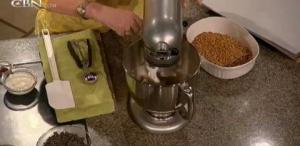Docs Sour over Bovine Growth Hormone
A tall glass of milk may not be as safe as you think it is. CBN News Science & Medical Reporter Gailon Totheroh investigates why rBGH is being banned.
Transcript
Walk into a Starbucks and order your java "No caf, no whip" and they'll know what you mean. Ask for "no rBGH" and they'll be clueless.
rBGH? That's short for "recombinant bovine growth hormone" -- also known as BGH. Starbucks management isn't clueless on BGH -- their milk will be BGH-free by the end of the year.
Rick North heads the Campaign for Safe Food in Oregon. He said, "The foundation of this house of cards is consumer ignorance because once consumers find out about this stuff they will understand why Canada, all 25 countries of the European Union, Australia, and New Zealand have all banned the use of rBGH."
Sunshine Dairy in Portland, Ore., was ahead of the curve.
"In 1995 is when we got our first load, our first tanker of milk in -- that we started segregating for certain customers that we're asking for it," Manager Mike Prom said.
In 1998, they got rid of it altogether.
So what's the beef about rBGH?
Made by chemical giant Monsanto, it's better known as Posilac. Injections make the cows produce more milk. Cows then also produce more of a growth factor called IGF-1 into the milk. IGF-1 is identical in both cows and humans.
"Increased levels of IGF-1 are associated with a number of cancers such as breast, lung, prostate and colon cancer," Dr. Martin Donohue, with Oregon Physicians for Social Responsibility said.
"In cattle who are treated with rBGH to begin with. there are a number of reproductive health effects including low birth weight calves that are born and effects on ovarian function and uterine function," he added.
In other words, there's reason to suspect there could be harm for women of child-bearing age.
Monsanto has contended that digestion destroyed the IGF-1 and thus there was no problem. But research has shown that milk protein protects IGF-1 from digestion -- leaving it intact to enter the blood stream.
Dr. Jenny Pompilio says sadly most doctors don't know this. She first learned of rBGH just a few years ago.
"It made me wonder in the past if I was exposed to this back in the Midwest without ever being aware of it," she said. "And statistically since rBGH was approved in 1993 and the use increased thereafter, I probably was exposed."
Donohue faults the Food and Drug Administration for not being careful enough.
"The data were not all available. and there were a number involved in the decision-making process at the FDA who had direct links with Monsanto," Donahue said.
"The way the FDA works is kind of like, 'Show me the dead bodies.' You know, if you can point to a direct, acute effect that's causing people to die, they may take action," Rick North said.
Europe's ban came in 2000 based largely on adverse side effects on cows, including breast infections that require antibiotics.
"The more antibiotics that you use in agriculture the more you select out for resistant bacteria which can then be transferred to human beings," Donohue said.
That transfer can mean the spread of stronger bugs or creating them in people from antibiotic residues they consume. Antibiotics become ineffective and infections harder to stop.
But dairy farmers using Posilac® say it's safe and the extra milk keeps consumer prices down. However other farmers who once used it say the extra cost of feed, additional veterinary services and increased bovine burn-out isn't worth it.
Still Monsanto contends that BGH is cost effective for farmers and safe for people.
Monsanto recently tested grocery store milk -- comparing brands labeled as BGH-free with other brands presumably from BGH cows. The company says they found no difference in the amount of IGF-1 or antibiotic residues between the two varieties.
Critics charge the study is misleading. Why? Some milk not labeled as BGH-free actually is. So Monsanto was comparing BGH-free milk with an unknown mixture of both kinds.
For consumers, what is known is that BGH-free milk comes two ways: organic and products labeled as being free of BGH. They are more expensive.
"As a mother and a physician to know that I'm giving my son something that is safer for his long-term health is worth the extra 50 cents," Jenny Pompilio said.
"This is back to the family farm, back to good morals, good values, good judgment, and I believe more consumers are asking for it," Prom said. "This has been the change."
Download
Right-click on a link below and choose "Save link as..." to save the file
High Definition - MP4
High Quality - MP4
Low Bandwidth - MP4





